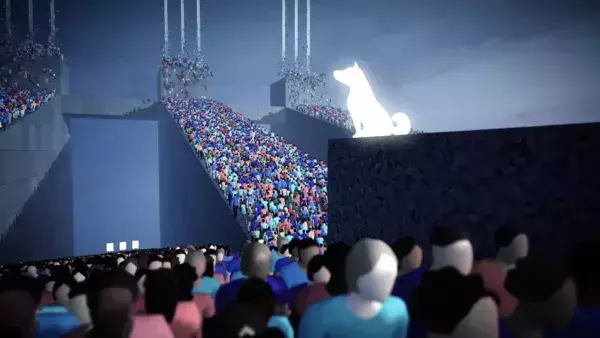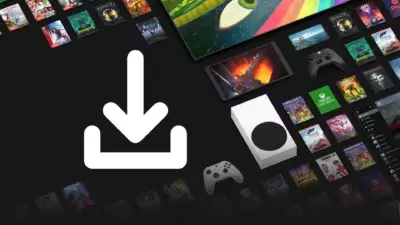
Networking, in the context of making professional connections, is a dirty word. It’s one I often hear developers use semi-ironically to indicate that it’s ridiculous, even though they engage in it. We associate certain images with the word: preened men and women in tailored suits roaming an expensive hotel function area, feverishly shaking hands with anything that moves. They have American Psycho-style business cards and a 2:1 in Social Exploitation.
We’re primarily given this idea because, I think, the corporate sharks we see on TV and film are the only ones who usually own the term and use it straight-facedly. But we also get it reinforced by educators. You’ll probably be familiar with the myth of the elevator pitch: for whatever reason, you find yourself in a lift with a studio executive, CEO, or financier. You’re a nobody. You have 30 to 90 seconds with this person as your captive audience in which to convince them of your game, movie, book, or other incredible ideas.
///
Jamming can be a great way to build camaraderie with new people. I’m pictured here doing my best Steve Jobs.
Even less evil characters in films like La La Land still espouse this high-pressure, important-person-hunting version of networking; the lyrics from Someone in the Crowd read: “You make the right impression, then everybody knows your name, someone in the crowd could be the one you need to know, the one to finally lift you off the ground.”
Naturally, most game developers take one look at this intimidating, high-stakes, charisma-requiring prospect and think, “Nah, I’ll just stay home and make the damn game.”

Feral Vector is the go-to event for making new friends. Silliness, woods, diversity. What more could you ask for?
Don’t be a shark
Here’s the thing: the ideas presented above are unrealistic, pig-headed, and, most importantly, not networking. Networking is about creating a web of connections to people in your chosen industry who are looking out for you, and who you look out for in return. In other words, it’s just making industry-specific friends.
Let’s imagine a fresh game design student. She’s graduated with a first but was too stressed out during her dissertation to apply to graduate programmes – not that there were enough available for all the people with firsts anyway. She needs a games job, so she has a look at indeed.com and maybe contacts a few local studios with her portfolio. No dice.
Where does she turn now? Most of her uni friends are working retail jobs while they’re looking, so she figures that’s not a bad thing to do. She gets financially comfortable living at her parents, and nothing promising comes up on the generic job sites she checks. Eventually, she stops checking them.
The problem with this story isn’t the student’s ability. The problem is there’s no longer anyone telling her what to do next, advising her on which opportunities to go for, or exposing her to new influences.

In my second year at university, I asked my lecturer, “I’m serious about this, what should I do?” She sent me to my first-ever event, below.
It’s just making pals
These are gaps which a friendly little professional network will fill. Consider this alternate series of events:
The student goes to a game jam alone during the second year of her course and works with a slightly older developer making a niche game in their spare time as a hobby. They bond over a shared love of the Yakuza games, a friendship begins, and a month or two down the line the student playtests the older developer’s game.
The student decides to go to EGX in her third year, where she meets up with her hobbyist friend. They play some small-time games and get chatting to the people making them about the similarities between the hobbyist’s game and the ones being shown. The people making the small games ask if they’re going to the get-together later that night. Where is it, she asks. Everyone drinks a little too much and bonds.
This repeats a few times, and when our student ends up graduating with a 2:1 instead, she doesn’t know what to do with herself; indeed.com fails her again. But in this reality, she asks her developer friends how to get her career started. They critique her portfolio and send her jobs they spot on Twitter or through invite-only industry backchannels. They take her with them to other events, to talks, and introduce her to people who might hire her. Maybe she gets a job; maybe she creates her own, or maybe she goes freelance. But whatever she does, there are friends on her side, in her industry, to give her well-informed direction.
Access to success
Recently, I needed to know which localisation languages to target for our game, Ring of Fire. So what did I do? I used an industry backchannel (the UKGI Slack) to ask a more experienced developer what she did with her game, and she gave me great advice. I’d never met this person, but both being in the ‘inner circle’ meant we were on each other’s side. And when I spent a year horribly depressed as an English teacher, to make money so my wife could transition careers, it was my network of industry friends who pulled me out of it and brought me the opportunities I needed.
Hopefully, it’s clear that having this network of pals is an advantage at all stages of a career. Networking isn’t pouncing on some suited exec and selling them a golden idea; it’s caring, communal, and inclusive. Through sharing your own skills and knowledge with your network, you in return gain the benefit of everyone else’s.

This is networking. It’s not suits in elevators; it’s nerds playing games in old churches, and making each other illustrated cardboard certificates.
And this is why networking is such a vital thing to do. You know the proverb that says teaching a person to fish will feed them for life? Think of networking like this: teach a dev to do a task, and you prepare them for a day. Teach a dev to network, and you prepare them for life.
So, if you haven’t already got many industry friends, do it now. Book into a game jam, or a talks evening. Go to a non-corporate event like Feral Vector, a Women In Games evening, or a BAME meet-up. Oh, and if you’re an educator, show this to your damn students.
Speaking out
One of the best pieces of advice I received was to speak at an event. As soon as you have something you feel you could share, even the smallest specialism, offer to speak about it at a small talks night or other events. Once you do this, people will remember you as having something to say, and some will come and speak to you directly about your topic. I made some of my best industry buddies this way.





